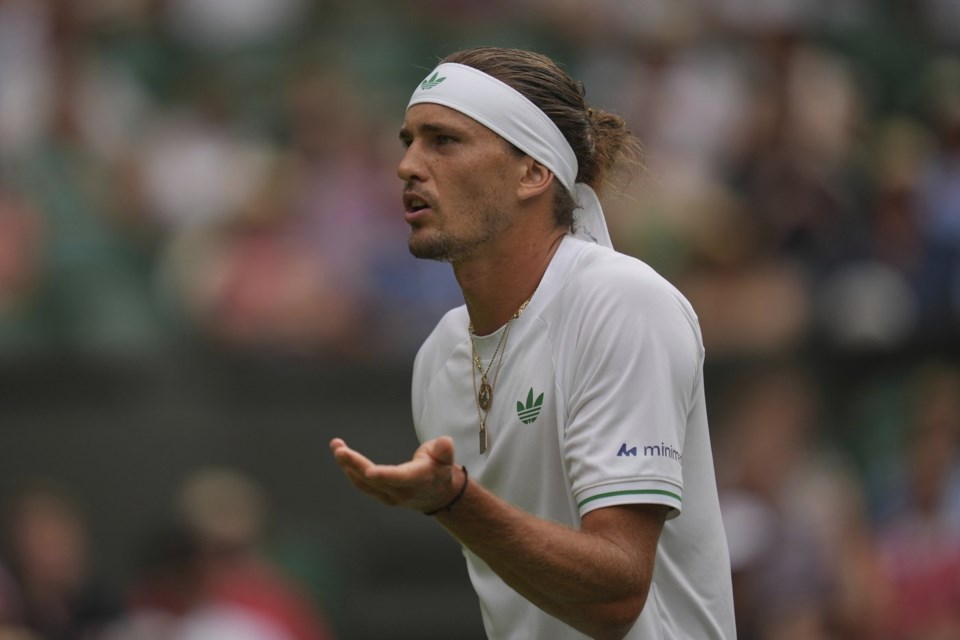LONDON (AP) — When Naomi Osaka opened up about her anxiety and depression at the 2021 French Open, it sparked a conversation in sports — and society at large — about mental health and the importance of addressing such issues.
In the time since, more and more players have spoken about the topic and seeking help, and whatever taboos there were seem to have faded. Still, the way three-time Grand Slam finalist Alexander Zverev discussed his state of mind after a first-round exit at Wimbledon this week revived the conversation.
“I feel very alone out there at times. I struggle mentally. ... I’m trying to find ways to kind of get out of this hole. I keep kind of finding myself back in it in a way,” said Zverev, who was the runner-up at the Australian Open in January but then went through a rough stretch of results this season when he had a chance to overtake Jannik Sinner at No. 1 in the rankings.
Alexander Zverev says at Wimbledon he feels ‘quite alone in life’
“I feel, generally speaking, quite alone in life at the moment, which is a feeling that is not very nice," Zverev said. "It’s not a feeling on a tennis court, it’s just a life feeling in general.”
Players at the All England Club were asked Wednesday about Zverev's words.
They could empathize, some said.
Others offered advice.
Amanda Anisimova was a French Open semifinalist as a teen in 2019, then announced two years ago she was taking time off because of burnout. She's been back for a while now and reached the third round at Wimbledon with a victory Wednesday.
“It’s definitely tricky. Each and every one of us goes through something at some point in our lives. We have our bouts of negative times. It honestly takes some self-reflecting, figuring out what’s going wrong or how can I create a lifestyle that I enjoy. I feel like there are so many factors. For me, personally, it was finding people that I could confide in and I trusted. People that I could talk to," Anisimova said.
“What Alex said about feeling lonely ... a lot of people struggle with being lonely, especially on the pro circuit,” she said, adding that taking a break from tour life "really helped me and I'm happy I did that, because I came back with a new perspective, felt refreshed, and I feel like I learned a lot about myself.”
Wimbledon athletes talk about turning to therapy for help
Top-ranked Aryna Sabalenka, who owns three major trophies, said that she worked with a therapist for five years.
“It's really important to talk openly about whatever you’re dealing with. ... It’s really important to be open and to talk about what are you experiencing, because if you’re going to keep it inside, it’s just going to destroy you. I think that’s kind of like something happening to him,” Sabalenka said. “I think (Zverev) just needs to open up to whoever is close to him.”
At the Australian Open, title winner Madison Keys addressed her reliance on therapy and the ways in which it both allowed her to be happier, in general, and more successful at tennis — a sport in which losses are frequent and expectations can be a burden.
On-court losses in tennis can affect off-court identities
“Our identity becomes very wrapped up in being a tennis player. That’s great, but when you have the tough kind of weeks, months, years on tour, that can really take a toll on how you think about yourself as a person,” Keys, a 30-year-old American, said Wednesday.
“So being able to kind of dive into that and figure out how to separate the two and know that you’re not just a tennis player, you're a full person that has all of these other really great attributes and other interests and just different things in your life.”
When a reporter asked the No. 3-seeded Zverev after his loss to unseeded Arthur Rinderknech on Tuesday whether he might consider trying therapy, the 28-year-old German replied: “For the first time in my life, I’ll probably need it.”
This is how he described his current mindset: “I’ve never felt this empty before. Just lacking joy, just lacking joy in everything that I do. It’s not necessarily about tennis. Just lacking joy outside of tennis, as well.”
Andrey Rublev, a 10-time Slam quarterfinalist from Russia who is seeded 14th at Wimbledon, said after his win Wednesday that life on tour, in and of itself, is not the problem for someone like Zverev.
“Tennis is just the trigger point,” Rublev said. “It’s something inside of you that you need to face.”
___
More AP tennis: https://apnews.com/hub/tennis
Mattias Karen And Howard Fendrich, The Associated Press




